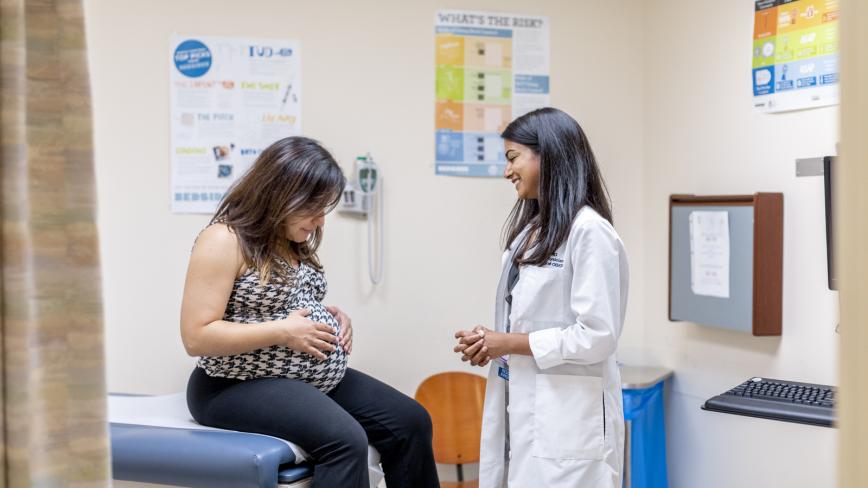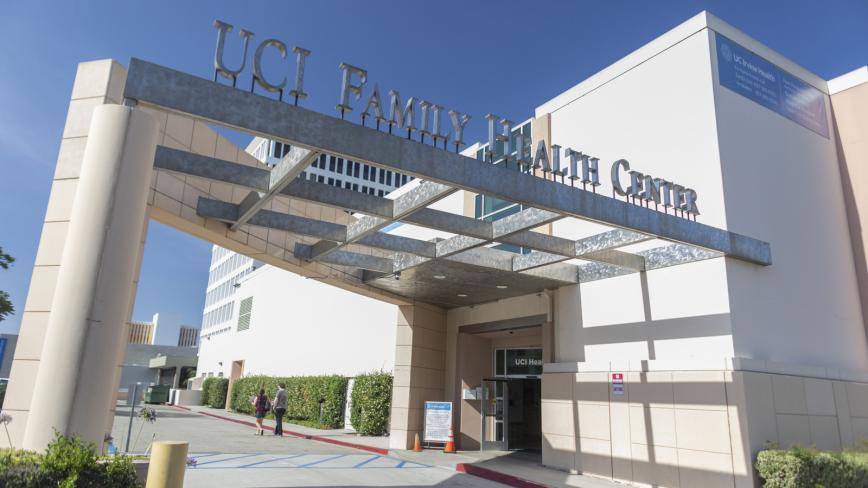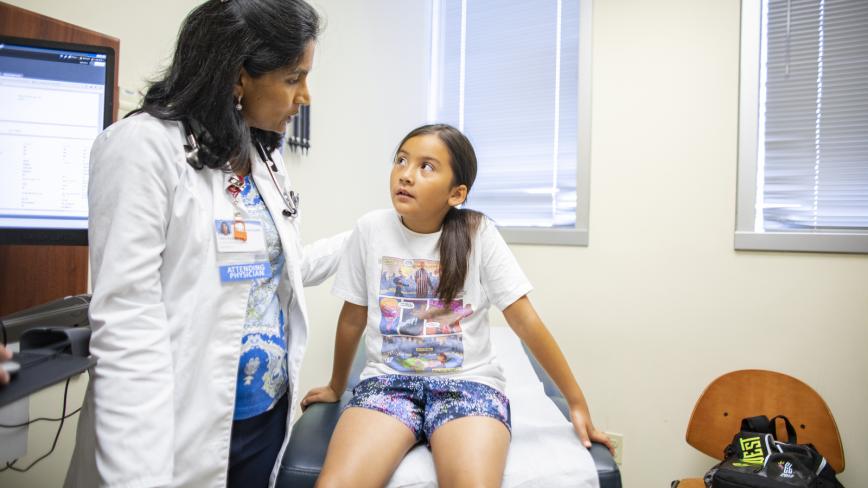When people come to UCI Health Family Health Centers in Santa Ana and Anaheim, they step into spaces designed to deliver accessible, whole-family care.
Children’s books in the exam rooms help put kids at ease. On-site pharmacies make it easier for people to access medications. Diabetes management classes educate participants about healthy living with the chronic disease. And, translation services help clients navigate the range of primary and preventive health care services offered.
UCI Health Family Health Centers in Santa Ana and Anaheim are two locations of the federally qualified health center (FQHC). These clinics provide affordable, comprehensive primary care, including medical, dental and behavioral health services for communities where access to health care services is challenging. FQHCs, like the one at UCI Health, are crucial in ensuring people have access to health care, regardless of their insurance coverage or ability to pay.
Supporting a proactive approach to personal, community and public health
FQHCs like the UCI Health centers are foundational to California’s health care safety net. In California, FQHCs and similar locations provide care to more than 5.5 million people, over 65 percent of whom are Medi-Cal members.
FQHCs typically serve a wide range of people, many of whom balance health care visits with work schedules, yet may have little or no health insurance or receive their medical benefits from Medi-Cal. Many of UCI Health Family Health Centers’ patients are employed but either work in jobs that do not provide employer-sponsored health benefits or do not earn enough to afford commercial health insurance coverage.
Empowering patients through preventive care and education
Supporting patient health education and literacy is a key focus for health care professionals at the UCI Health FQHC. Recognizing that many individuals may be unfamiliar with navigating the health system or managing chronic conditions, the centers offer personalized education to improve health literacy and empower patients to take charge of their well-being.
Through routine medical visits, nutritional workshops, and one-on-one counseling, patients learn how to confidently manage their health. Staff also help patients understand their benefits, enroll in coverage, and access community resources—support that is especially vital for working families.
Shane Jones, M.D., a UCI Health physician specializing in primary care and family medicine at UCI Health Family Health Center, offers this perspective. “I help give my patients the know-how and access to the resources they need to take the power over their own health care. Providing them with this agency helps them take responsibility for their own health.”
“The best of both worlds”
As part of the county’s only academic health system, the UCI Health Family Health Centers occupy a unique place among other FQHCs in Orange County and across California. Both the Anaheim and Santa Ana locations are firmly committed to providing the highest quality health care to their local communities and can leverage the resources of UC’s academic health system.
Jones gives an example from his practice. “I recently had a patient who had rheumatoid arthritis but would not be able to see a specialist for several months. I was able to secure an e-consult from a specialist within the UC Health system to get my patient a prescription that would tide her over until she could get in to see that specialist.”
“You don’t get that kind of access in other places. When we’re stuck, there’s always something I can do or a specialist I can contact to help. It’s the best of both worlds.”
“They made it easier for me”
The hallways of the UCI Health Family Health Center – Santa Ana are lined with stories of those who have received care there, like Rosemary. Rosemary, a new mother, had been a patient at UCI Health Family Health Center years before her pregnancy. Rosemary had diabetes, and while she hadn’t managed her condition well before she became pregnant, once she was expecting a child, the health care team at the family health centers helped her realize the importance of taking initiative to care for her health, especially since she was a high-risk pregnancy.
She successfully delivered Cesar, her son, at one of the family health centers. She cites the care and attention of the FQHC team who helped her become more responsible when it came to her health and her diabetes, especially as a new mother.
When asked about her experience, Rosemary says that “they made it easier for me going through my pregnancy.” She continues to bring Cesar and herself to the health center where they both receive care.
“When I came here, I knew I was going to be taken care of. To this day, they stay true to their part,” Rosemary adds.
A continuity of care based on lasting relationships
The physicians and other health care professionals in UCI Health Family Health Centers often form lasting relationships with their patients and their families across generations. In fact, UCI Health Family Health Centers are the oldest FQHCs in Orange County, providing a home for these stable, ongoing connections between clinicians and the community.
Early in his residency, Jones recalls meeting one young couple. The young woman came into the center for what she believed was abdominal discomfort, but she was pregnant. He followed this patient throughout her pregnancy, delivered her baby, and has been the family’s - mom, dad, and child – primary care physician ever since.
“All this happened at an FQHC, close to where this family lived. Because I understand the culture of the community where I work, I’ve been able to help this family overcome a general mistrust of medicine and have established an ongoing relationship and a rapport that they can trust.”
A medical home for Orange County families
For many patients, the FQHC serves as a vital part of their community and a central destination for their health care needs, offering services for the whole family. UCI Health Family Health Centers provide more than 120,000 patient visits annually. Regardless of ability to pay, all patients can be seen and receive care on a sliding fee scale. The centers were recognized as among the top FQHCs in the country by the U.S. Health Resources and Services Administration’s 2023 Community Health Quality Recognition program, which placed the UCI Health Family Health Center in the top 10 percent of all health centers in the nation.
The centers offer a broad scope of services to meet the unique needs of each family member. These include:
- Whole-family medical care, including diagnosis and treatment of chronic conditions such as diabetes, asthma, high blood pressure and arthritis
- Children’s health services, such as well-child exams, immunizations, school physicals and care for children with special needs
- Women’s health services, including prenatal care, Pap smears, and reproductive health care
- Same-day appointments
- On-site dental clinic
- Mental and behavioral health care
- Nutritional counseling and social services
- On-site pharmacy to ensure quick and convenient access to prescribed medications
Translation services are also available to patients, with bilingual staff and onsite translation assistance, including but not limited to — Spanish, Vietnamese, Mandarin/Chinese and Farsi.
“The place that people trust”
UCI Health’s FQHC is an anchor for the communities they serve in Orange County. Leanne Funada, interim executive director of the UCI Health Family Health Centers, notes that “the health care teams at UCI Health Family Health Centers understand the needs of the communities where they’re located. The health care professionals put the members first – they take time to listen, understand their concerns and provide the type of care that the community needs.”
Jones agrees. In his experience, he’s found that in health care generally, it’s not uncommon to hear of patients’ experiences with their doctors as being a one-sided conversation where they’re told what to do – take this medication, watch your diet, exercise more – with little or no room for dialogue. Jones explains that the UCI Health Family Health Centers are different.
“When patients are able to play a part and have a say in their treatment plan, that empowers them to make decisions for themselves,” Jones notes. “Patients have more agency when they know what’s going on.”
Patient education and advocacy also form a big part of clinicians’ jobs at the FQHCs.
“A huge part of my role is providing patient education,” Jones adds. “I also serve as an advocate for patients in our communities. I take the time to understand the culture and where they’re coming from. That helps me earn their buy-in.”
“We’re the place that people trust,” Jones concludes.
About University of California Health
University of California Health comprises six academic health centers, 21 health professional schools, a Global Health Institute and systemwide services that improve the health of patients and the University’s students, faculty and employees. All of UC’s hospitals are ranked among the best in California and its medical schools and health professional schools are nationally ranked in their respective areas.



